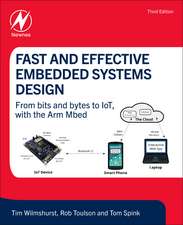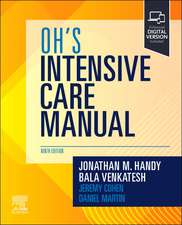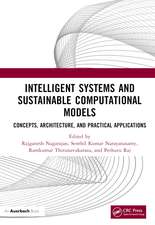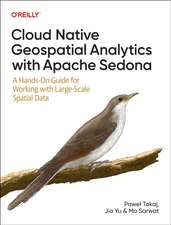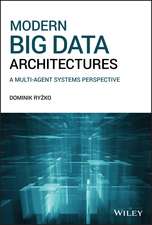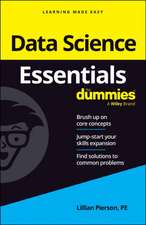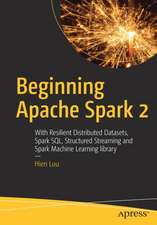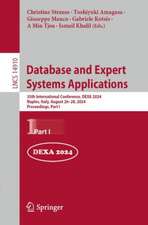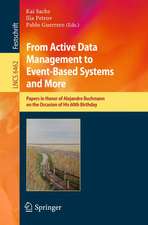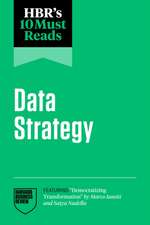Real-time Linked Dataspaces: Enabling Data Ecosystems for Intelligent Systems
Autor Edward Curryen Limba Engleză Hardback – 27 noi 2019
The book is divided into five major parts: Part I “Fundamentals and Concepts” details the motivation behind and core concepts of real-time linked dataspaces, and establishes the need to evolve data management techniques in order to meet the challenges of enabling data ecosystems for intelligent systems within smart environments. Further, it explains the fundamental concepts of dataspaces and the need for specialization in the processing of dynamic real-time data. Part II “Data Support Services” explores the design and evaluation of critical services, including catalog, entity management, query and search, data service discovery, and human-in-the-loop. In turn, Part III “Stream and Event Processing Services” addresses the design and evaluation of the specialized techniques created for real-time support services including complex event processing, event service composition, stream dissemination, stream matching, and approximate semantic matching. Part IV “Intelligent Systems and Applications” explores the use of real-time linked dataspaces within real-world smart environments. In closing, Part V “Future Directions” outlines future research challenges for dataspaces, data ecosystems, and intelligent systems.
Readers will gain a detailed understanding of how the dataspace paradigm is now being used to enable data ecosystems for intelligent systems within smart environments. The book covers the fundamental theory, the creation of new techniques needed for support services, and lessons learned from real-world intelligent systems and applications focused on sustainability. Accordingly, it will benefit not only researchers and graduate students in the fields of data management, big data, and IoT, but also professionals who need to create advanced data management platforms for intelligent systems, smart environments, and data ecosystems.
| Toate formatele și edițiile | Preț | Express |
|---|---|---|
| Paperback (1) | 322.43 lei 43-57 zile | |
| Springer International Publishing – 11 sep 2020 | 322.43 lei 43-57 zile | |
| Hardback (1) | 355.82 lei 43-57 zile | |
| Springer International Publishing – 27 noi 2019 | 355.82 lei 43-57 zile |
Preț: 355.82 lei
Preț vechi: 444.78 lei
-20%
Puncte Express: 534
Preț estimativ în valută:
62.90€ • 74.100$ • 54.56£
62.90€ • 74.100$ • 54.56£
Carte tipărită la comandă
Livrare economică 16-30 martie
Specificații
ISBN-13: 9783030296643
ISBN-10: 3030296644
Pagini: 325
Ilustrații: XXIII, 325 p. 111 illus., 30 illus. in color.
Dimensiuni: 155 x 235 mm
Greutate: 0.67 kg
Ediția:1st ed. 2020
Editura: Springer International Publishing
Colecția Springer
Locul publicării:Cham, Switzerland
ISBN-10: 3030296644
Pagini: 325
Ilustrații: XXIII, 325 p. 111 illus., 30 illus. in color.
Dimensiuni: 155 x 235 mm
Greutate: 0.67 kg
Ediția:1st ed. 2020
Editura: Springer International Publishing
Colecția Springer
Locul publicării:Cham, Switzerland
Cuprins
1 Real-time Linked Dataspaces: A Data Platform for Intelligent Systems within Internet of Things-based Smart Environments.- 2 Enabling Knowledge Flows in an Intelligent Systems Data Ecosystem.- 3 Dataspaces: Fundamentals, Principles, and Techniques.- 4 Fundamentals of Real-time Linked Dataspaces.- 5 Data Support Services for Real-time Linked Dataspaces.- 6 Catalog and Entity Management Service for Internet of Things-based Smart Environments.- 7 Querying and Searching Heterogeneous Knowledge Graphs in Real-time Linked Dataspaces.- 8 Enhancing the Discovery of Internet of Things-based Data Services in Real-time Linked Dataspaces.- 9 Human-in-the-Loop Tasks for Data Management, Citizen Sensing, and Actuation in Smart Environments.- 10 Stream and Event Processing Services for Real-time Linked Dataspaces.- 11 Quality of Service-Aware Complex Event Service Composition in Real-time Linked Dataspaces.- 12 Dissemination of Internet of Things Streams in a Real-time Linked Dataspace.- 13 Approximate Semantic Event Processing in Real-time Linked Dataspaces.- 14 Enabling Intelligent Systems, Applications, and Analytics for Smart Environments using Real-time Linked Dataspaces.- 15 Autonomic Source Selection for Real-time Predictive Analytics using the Internet of Things and Open Data.- 16 Building Internet of Things-enabled Digital Twins and Intelligent Applications using a Real-time Linked Dataspace.- 17 A Model for Internet of Things Enhanced User Experience in Smart Environments.- 18 Future Research Directions for Dataspaces, Data Ecosystems, and Intelligent Systems.
Notă biografică
Edward Curry is a research leader at the Insight Centre for Data Analytics at the National University of Ireland Galway. His research interests are predominantly in open distributed systems, particularly in the areas of incremental data management (e.g. dataspaces), approximation and unstructured events types, with a special interest in applications for smart environments and data ecosystems. Edward has published over 160 scientific articles in journals, books, and international conferences.
Textul de pe ultima copertă
This open access book explores the dataspace paradigm as a best-effort approach to data management within data ecosystems. It establishes the theoretical foundations and principles of real-time linked dataspaces as a data platform for intelligent systems. The book introduces a set of specialized best-effort techniques and models to enable loose administrative proximity and semantic integration for managing and processing events and streams.
The book is divided into five major parts: Part I “Fundamentals and Concepts” details the motivation behind and core concepts of real-time linked dataspaces, and establishes the need to evolve data management techniques in order to meet the challenges of enabling data ecosystems for intelligent systems within smart environments. Further, it explains the fundamental concepts of dataspaces and the need for specialization in the processing of dynamic real-time data. Part II “Data Support Services” explores the design and evaluation of critical services, including catalog, entity management, query and search, data service discovery, and human-in-the-loop. In turn, Part III “Stream and Event Processing Services” addresses the design and evaluation of the specialized techniques created for real-time support services including complex event processing, event service composition, stream dissemination, stream matching, and approximate semantic matching. Part IV “Intelligent Systems and Applications” explores the use of real-time linked dataspaces within real-world smart environments. In closing, Part V “Future Directions” outlines future research challenges for dataspaces, data ecosystems, and intelligent systems.
Readers will gain a detailed understanding of how the dataspace paradigm is now being used to enable data ecosystems for intelligent systems within smart environments. The book covers the fundamental theory, the creation of new techniques needed for support services, and lessons learned from real-world intelligent systems and applications focused on sustainability. Accordingly, it will benefit not only researchers and graduate students in the fields of data management, big data, and IoT, but also professionals who need to create advanced data management platforms for intelligent systems, smart environments, and data ecosystems.
The book is divided into five major parts: Part I “Fundamentals and Concepts” details the motivation behind and core concepts of real-time linked dataspaces, and establishes the need to evolve data management techniques in order to meet the challenges of enabling data ecosystems for intelligent systems within smart environments. Further, it explains the fundamental concepts of dataspaces and the need for specialization in the processing of dynamic real-time data. Part II “Data Support Services” explores the design and evaluation of critical services, including catalog, entity management, query and search, data service discovery, and human-in-the-loop. In turn, Part III “Stream and Event Processing Services” addresses the design and evaluation of the specialized techniques created for real-time support services including complex event processing, event service composition, stream dissemination, stream matching, and approximate semantic matching. Part IV “Intelligent Systems and Applications” explores the use of real-time linked dataspaces within real-world smart environments. In closing, Part V “Future Directions” outlines future research challenges for dataspaces, data ecosystems, and intelligent systems.
Readers will gain a detailed understanding of how the dataspace paradigm is now being used to enable data ecosystems for intelligent systems within smart environments. The book covers the fundamental theory, the creation of new techniques needed for support services, and lessons learned from real-world intelligent systems and applications focused on sustainability. Accordingly, it will benefit not only researchers and graduate students in the fields of data management, big data, and IoT, but also professionals who need to create advanced data management platforms for intelligent systems, smart environments, and data ecosystems.
Caracteristici
Establishes the theoretical foundations and principles of real-time linked dataspaces as a data platform for intelligent systems Introduces specialized best-effort techniques and models to enable incremental semantic integration for managing and processing data streams Explores the use of real-time linked dataspaces within real-world smart environments


